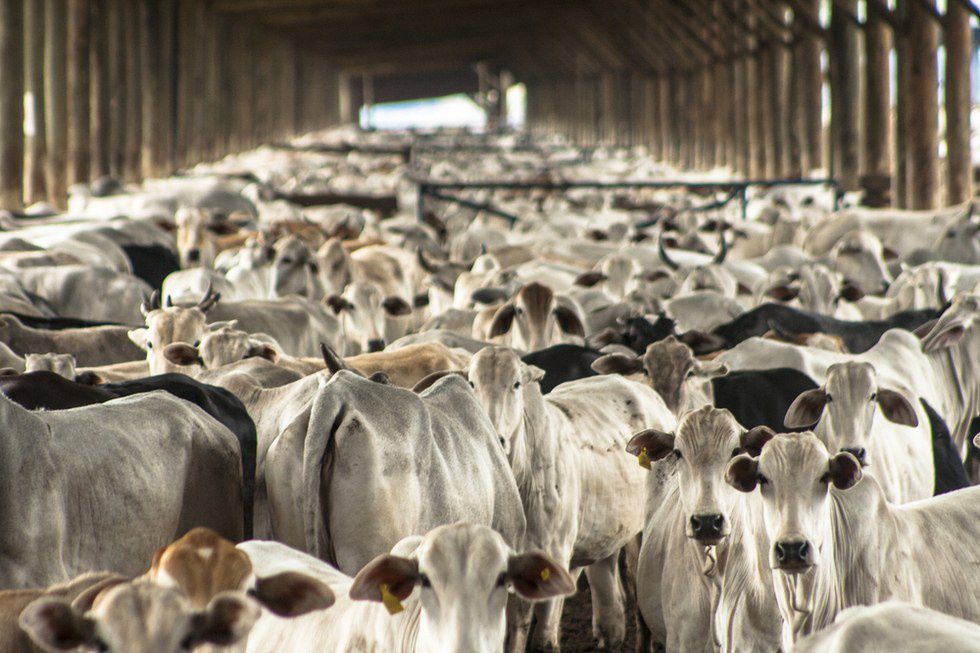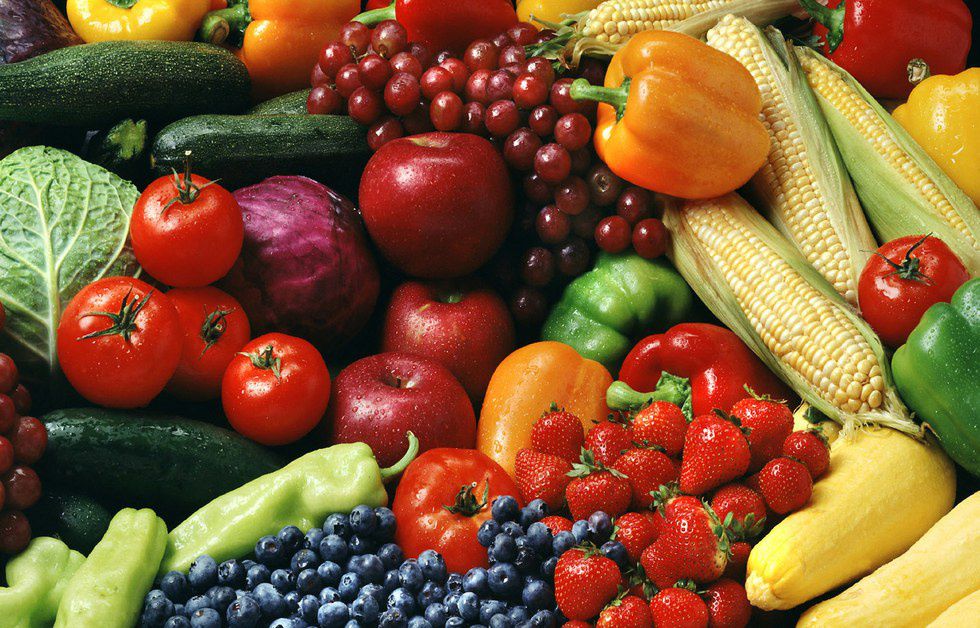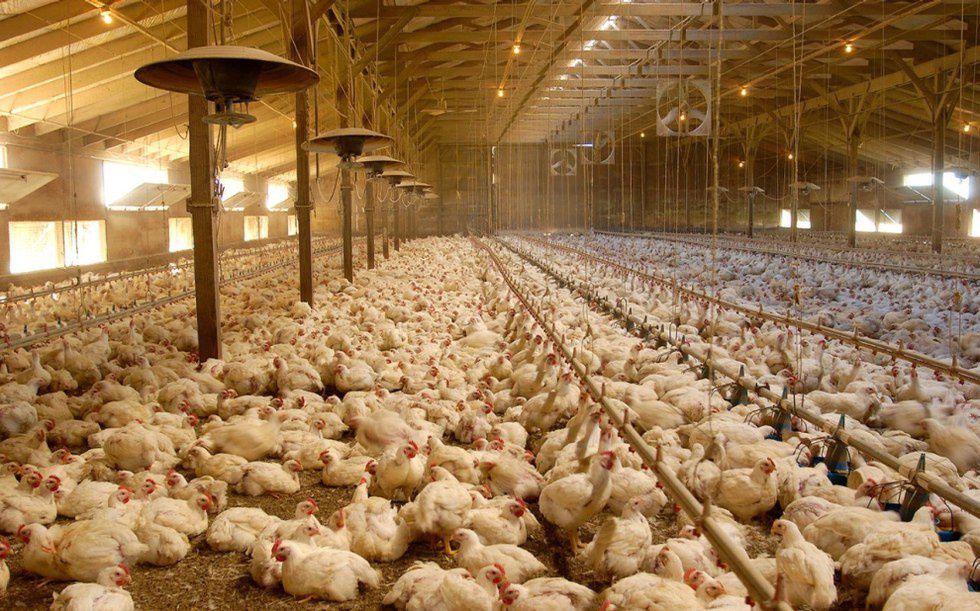Supposedly that burger on the menu says it has lettuce, tomatoes, cheese and onions on it; but do we really know what’s inside that sandwich? Most people don’t think about what they’re eating while they’re eating it. They could either be completely oblivious to the roots of where that burger came from or they just couldn’t care less. Hopefully, this article opens your eyes to the truth behind that burger and makes you more concerned about the daunting issues behind the American food system.
The gap between Americans and the source of their food is rapidly increasing in size.The food corporations of America have purposely set up an opaque curtain; preventing Americans from discovering the source of their food. Have you ever stopped and wondered why the origins of our food are completely hidden from us? It’s most likely because the gruesome truth behind the American food system is too hard to bear. I believe that if you knew what you were actually eating, you wouldn’t eat at all.
So let’s talk about that burger again- we all know that burgers are made from beef. And to make a burger, you grind the meat first, mix in spices and other desired ingredients, and eventually cook the meat until it’s ready to be thrown onto a bun. But many people are unaware of the very beginning steps of making a burger. Picture this- 500 or more beef cows crammed together, standing outside (day and night, and whether it’s pouring rain or blazing hot). Every winter, cattle freeze to death in states such as Montana, Nebraska, and North Dakota. And every summer, cows collapse from heatstroke in states such as Texas and Arizona. To mark cows for identification, ranchers restrain the animals and press hot fire irons into their flesh, causing third-degree burns, as the cows bellow in pain and attempt to escape. Male calves’ testicles are ripped from their scrotums, often without pain relievers, and the horns of cows raised for beef are cut or burned off. Beef cattle are fed a highly unnatural diet to fatten them up. This causes chronic digestive pain and the stomach becomes so full of gas that breathing is impaired because of compression of the lungs. According to a study published in the Journal of Animal Science, more than 46 percent of cattle raised for beef die before they are even sent to a slaughterhouse.
To make matters worse, the meat you’re consuming contains hormones, antibiotics, pesticides and dioxins have been found to increase the risk of cancer, heart problems and other degenerative diseases in humans. Further, emerging foodborne diseases are causing public and ecosystem health challenges around the world and are often traced back to industrial animal agriculture. The truth is not only do factory farms lead to the mistreatment, suffering and death of billions of animals every year, but they also cause soil contamination, loss of biodiversity, greenhouse gas emissions and land, energy and water wastage. This is not just an animal welfare or environmental concern, it’s also a humanitarian crisis, because factory farms are diverting precious natural resources like land, water and fossil fuels to raise farm animals, while millions of people around the world are malnourished and still do not have access to safe drinking water.
Now you may be wondering, “But what can I do?” One way you can take a part of the taming of America’s food system is by supporting local farms and farmers. Fresh produce eaten in the Midwest travels an average of more than 1,500 miles. A study by the Leopold Center showed that increasing the consumption of regionally grown fresh produce by only 10% would save more than 300,000 gallons in transportation fuel per year. Supported Agriculture (CSAs) and Farmers Markets are both great ways to support a local food system. Another way to fight back is by eating organic food. Organic foods reduce the use of chemicals that require large amounts of energy to produce, pollute the soil and water, and present human health impacts. From 2009-2010 7.7% of produce sold in America was organic food but currently the numbers have dropped to nearly 4%.
Lastly, a great solution to the problem is to eat less meat. A meat-based diet (28% of a person's daily calories from animal products) uses twice as much energy to produce as a vegetarian diet. I have been vegetarian for a while now and I can’t tell you how amazing the feeling is knowing I’m somehow making an impact on this issue; no matter how small. I know that the idea of being switching to a vegetarian or vegan diet concerns some people, but if you do your research and look at the benefits of these diets, you may be surprised.
By writing this article I’m not trying to forcefully convert anyone to be vegetarian or vegan, or push my lifestyle onto you. But what I am trying to do is open your eyes to the horrors behind the American food system and plant ideas in your head of the options YOU have to make a change for yourself, the animals raised and slaughtered in factory farms, and any other human being or animal affected by large food corporations. If you found this article even slightly disturbing, just know that I didn’t even include the treatment of the 99.9 percent of chickens for meat, 97 percent of laying hens, 99 percent of turkeys, 95 percent of pigs, and 78 percent of dairy cattle that are located in the factory farms. My goal is that each person reading this article gets a wake-up call and stops and thinks about what they might do to aid in the fight against the American food system. This is a battle that will most likely be fought for many years but with your willingness to make a change for this cause, it’s a battle that can be won. So- will you join this movement and help us tame the food system of America?











 The minimum wage is not a living wage.
StableDiffusion
The minimum wage is not a living wage.
StableDiffusion
 influential nations
StableDiffusion
influential nations
StableDiffusion












